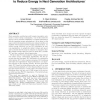Free Online Productivity Tools
i2Speak
i2Symbol
i2OCR
iTex2Img
iWeb2Print
iWeb2Shot
i2Type
iPdf2Split
iPdf2Merge
i2Bopomofo
i2Arabic
i2Style
i2Image
i2PDF
iLatex2Rtf
Sci2ools
CF
2004
ACM
2004
ACM
Combining compiler and runtime IPC predictions to reduce energy in next generation architectures
Next generation architectures will require innovative solutions to reduce energy consumption. One of the trends we expect is more extensive utilization of compiler information directly targeting energy optimizations. As we show in this paper, static information provides some unique benefits, not available with runtime hardware-based techniques alone. To achieve energy reduction, we use IPC information at various granularities, to adaptively adjust voltage and speed, and to throttle the fetch rate in response to changes in ILP. We evaluate schemes that are based on static IPC, runtime IPC and also combined, hybrid approaches. We show that IPC-based adaptive voltage scaling schemes can reduce energy consumption significantly, but the approach that also uses static IPC information in combination with runtime IPC, better captures program ILP burstiness and helps meet applications’ target performance: an important criterion in the real-time domain. We have found that static IPC-based f...
CF 2004 | IPC Information | Runtime Ipc | Static Ipc |
| Added | 30 Jun 2010 |
| Updated | 30 Jun 2010 |
| Type | Conference |
| Year | 2004 |
| Where | CF |
| Authors | Saurabh Chheda, Osman S. Unsal, Israel Koren, C. Mani Krishna, Csaba Andras Moritz |
Comments (0)

